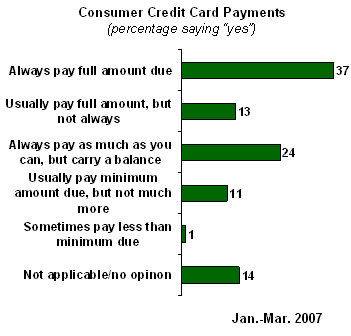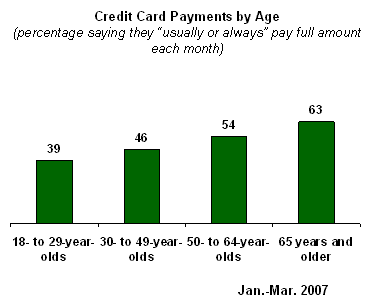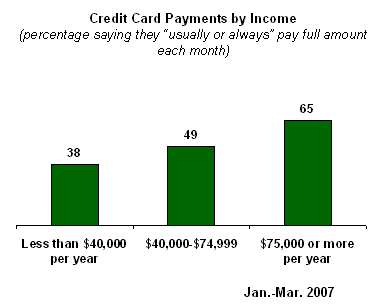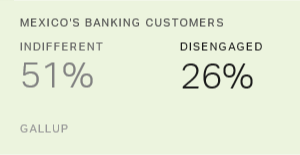GALLUP NEWS SERVICE
PRINCETON, NJ -- As the subprime mortgage market experiences a meltdown and home equity loan and line underwriting standards tighten, it is likely that many borrowers may turn to their credit cards as an alternate source of liquidity. This possibility raises a number of interesting questions: How will today's consumers make their credit card payments? What are the odds that we'll also see a sharp increase in credit card delinquencies during the months ahead?
During the first quarter of 2007, the Experian/Gallup Personal Credit Index (PCI) poll investigated how consumers handle their credit card payments and whether they are worried about being able to make their minimum monthly payments. Not surprisingly, the poll found that those types of behaviors depend on the consumer's age and income.
Making Credit Card Payments
Fifty percent of consumers say they essentially use their credit cards as a substitute for cash; 37% say they pay the full amount they owe on their credit cards monthly and another 13% say they usually pay the full amount but not always. Thirty-five percent of consumers actually use their credit cards as a loan; 24% say they pay as much as they can each month but usually leave a balance and 11% say they usually pay the minimum amount but not much more. Thirteen percent of consumers say they do not have a credit card.

Credit Card Payments by Age
Given the high interest rates associated with most credit cards, it is best for consumers to use them as a cash substitute. Older Americans are more likely than their younger counterparts to use their credit cards in this way. Nearly two in three (63%) consumers 65 years of age or older say they essentially use their cards as a cash substitute -- that is, they usually or always pay the full amount due on their credit cards each month. In sharp contrast, only 39% of 18- to 29-year-olds use their credit cards as a cash substitute. Fifty-four percent of 50- to 64-year-olds say they usually or always pay the full amount due on their credit cards each month, while 46% of 30- to 49-year-olds do the same.

Credit Card Payments by Income
As might be expected, upper-income consumers are also more likely to use their credit cards as a cash substitute than lower-income consumers. About two in three (65%) consumers having annual incomes of $75,000 or more say they essentially use their cards as a cash substitute. In sharp contrast, only 38% of consumers with annual incomes of less than $40,000 use their credit cards in this way. About half (49%) of consumers with incomes in between $40,000 and $75,000 say they usually or always pay the full amount due on their credit cards each month.

Credit Card Meltdown?
The fact that nearly half of all consumers essentially use their credit cards as a cash substitute is certainly a positive as far as consumer credit card debt is concerned. Still, 13% of consumers currently say they are very worried (5%) or moderately worried (8%) about making the minimum monthly payments on their credit cards. For younger consumers (18- to 29- year-olds) this percentage of worried credit card holders increases to 17%, while only 6% of those 65 or older are so concerned. Similarly, 21% of consumers having annual incomes of less than $40,000 are worried about making their minimum credit card payments, while only 5% of those making $75,000 or more annually voice this concern.
In the immediate term, it is probable that high-risk borrowers who have been accessing the subprime mortgage market for credit will now turn to credit cards as their loan source. While neither this substitution effect nor the subprime mortgage debacle as a whole necessarily suggests a credit card meltdown, the fact that about one in five younger Americans (18- to 29-year-olds) and a similar percentage of lower-income Americans (those making less than $40,000 a year) are worried about making the minimum payments on their credit cards right now should be of concern. From both an overall economic and credit default perspective, however, an even greater worry may involve assessing the consumer spending fallout that could result from a general tightening of underwriting standards not only in the mortgage market, but in all areas of consumer credit.
Survey Results
Results for this survey are based on telephone interviews with 3,013 adults, aged 18 and older, conducted Jan.-Mar. 2007. For results based on this sample, one can say with 95% confidence that the maximum margin of sampling error is ±2 percentage points. In addition to sampling error, question wording and practical difficulties in conducting surveys can introduce error or bias into the findings of public opinion polls.
